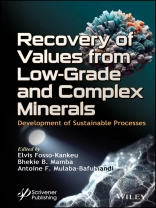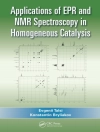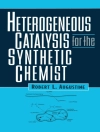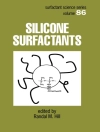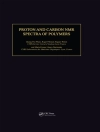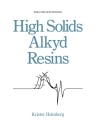Recovery of Values from Low-Grade and Complex Minerals
The book elaborates on various physicochemical properties of minerals and technological developments to improve the recovery of metals while ensuring cost-effectiveness and minimal environmental impact.
The mineral industry is undergoing significant cultural, organizational, and technological transformations to address some of the major limitations and challenges related to the environmental and productivity domains. As far as productivity is concerned, the decrease of high-grade ores has been one of the stumbling blocks toward the achievement of maximum recovery of metals while, on the other hand, the complexity of minerals therein makes it difficult to profitably extract metals using only conventional methods.
This book presents eight specialized chapters that focus on the exploration of the complexity of minerals that are likely to negatively influence the recovery of values, as well as the development of adequate technologies capable of improving the process of mineral concentration and/or metal recovery from complex minerals in a sustainable manner. It reviews the various physicochemical properties of minerals that are likely to pose a challenge during the attempt to recover values using conventional methods. It also elaborates on the recent technological development that has been considered by researchers to improve the recovery of metals from gangue-dominated minerals while ensuring cost-effectiveness and minimal adverse environmental impact.
Audience
This book will be of interest to academic researchers from the fields of mineral processing, hydrometallurgy, geochemistry, environment, chemistry, engineering, and professionals including mining plant operators, environmental managers in the industries, government regulatory bodies officers, and environmentalists.
表中的内容
Preface xiii
1 Optimization of the Mechanical Comminution — The Crushing Stage 1
Ngonidzashe Chimwani
1.1 Introduction 2
1.2 The Role of Crushers 5
1.3 Conclusion 31
2 Challenges Related to the Flotation Process of Complex Phosphate Ores 41
Nheta Willie and Hlahane Morake D.
2.1 Introduction to the Geology of Complex Phosphate Ores 42
2.2 Phosphate Rock Beneficiation Processes 44
2.3 Froth Flotation of Sedimentary Phosphate Ore 48
2.4 Challenges Facing Flotation of Phosphate Rock 54
2.5 Future Research Directions 58
2.6 Conclusion 58
3 Increasing Ionic Strength and Oxyhydroxo Species in Process Water on the Floatability of Chalcopyrite and Pentlandite for a Selected Cu–Ni Bearing Ore Flotation 65
Malibongwe S. Manono, Katlego M. Matibidi, Lisa L. October, Catherine K. Thubakgale and Kirsten C. Corin
3.1 Introduction 66
3.2 Materials and Methods 69
3.3 Results and Discussion 72
3.4 Froth Column Studies from a Two-Froth Column 78
4 Relating the Flotation Response of Pyrrhotite to the Adsorption of Sodium Carboxymethyl Cellulose and Sodium Isobutyl Xanthate on its Surface in Process Water of a Degrading Quality 87
Malibongwe S. Manono, Lisa L. October and Kirsten C. Corin
4.1 Introduction 88
4.2 Experimental Methods 91
4.3 Results and Discussion 97
4.4 Conclusions 107
5 Simulated Short Cycle Water Recirculation on the Flotation Performance of a UG2 Cu–Ni–PGM Ore 111
Malibongwe S. Manono, Michael S. Ngau and Kirsten C. Corin
5.1 Introduction 112
5.2 Materials and Methods 115
5.3 Results and Discussion 126
5.4 Conclusions 137
6 Complexity of Chalcopyrite Mineral Affecting Copper Recovery During Leaching 145
Kolela J. Nyembwe, Frans Waanders, Martin Mkandawire, Bhekie Mamba and Elvis Fosso-Kankeu
6.1 Introduction 146
6.2 Cu Fe S2 Crystal Structure 147
6.3 Application of Dissolution/Leaching of Chalcopyrite 148
6.4 Challenges Associated with Copper Dissolution from the Chalcopyrite Mineral 149
6.5 H2SO4-Fe2(SO4)3-Fe SO4-H2O Speciation 153
6.6 Parameters Affecting Dissolution 155
6.7 Thermodynamic Considerations 160
6.8 Cu Fe S2 Phases Conversion/Copper Sulfide (Cu-S) Intermediate Phases 161
6.9 Conclusion 172
7 Fe3+-Fe2+ Redox Cycle Peculiarity in the Acid Dissolution of Copper–Cobalt Complex Ores 179
Bienvenu Mbuya, Léon Zeka and Antoine F. Mulaba-Bafubiandi
7.1 Introduction 180
7.2 Conventional Leaching of Copper–Cobalt Minerals 182
7.3 Fe3+–Fe2+ Redox Cycle in the Dissolution of Mixed Oxidized and Sulfide Minerals 202
7.4 Application of Mineral–Mineral Leaching Process to the Dissolution of Complex Ores 208
7.5 Conclusion 212
8 Rare Earth Elements (REEs) in Complex Ores and Spent Materials: Processing Technologies and Relevance in the Global Energy Transition 217
Theophilus Ile Ojonimi, Tina Phiri Chanda, Ilemona C. Okeme, Ferdinand Asuke and Antoine F. Mulaba-Bafubiandi
8.1 Introduction 218
8.2 The Chemistry of REEs 220
8.3 REE Minerals and Deposit Types 220
8.4 REE Ore Mining and Processing Technologies 223
8.5 Relevance of REEs in Energy Transition 239
8.6 Conclusion 241
References 241
Index 249
关于作者
Elvis Fosso-Kankeu, Ph D, is a professor in the Department of Metallurgy, Faculty of Engineering and Built Environment, University of Johannesburg, Doornfontein, South Africa. His research focuses on the hydrometallurgical extraction of metal from solid phases, the prediction of pollutant dispersion from industrial areas, and the development of effective and sustainable methods for the removal of inorganic and organic pollutants from polluted water. He has published more than 220 papers including journal articles, books, book chapters, and conference proceedings papers. He has won several research awards including the NSTF Award (National Science and Technology Forum: largest science, engineering, technology, and innovation awards in South Africa and are known as the ‘Science Oscars’ of recent times) Engineering Research Capacity Development, in 2019.
Bhekie B. Mamba, Ph D, is the executive dean of the College of Science, Engineering, and Technology, the University of South Africa. Prof Mamba is a visionary and has occupied several leadership positions including being a Professor and Head at the Department of Applied Chemistry at the University of Johannesburg, and the Director of the Institute of Nanotechnology and Water Research at the University of Johannesburg. He has published about seven book chapters, over 250 journal articles, about 12 technical reports, and over 50 papers in conference proceedings. His general research interest involves developing advanced technologies for water treatment, which include nanotechnology and membrane technology.
Antoine F. Mulaba-Bafubiandi is emeritus professor at the University of Johannesburg, South Africa. He is the first Head of School of Mining, Metallurgy and Chemical Engineering, Faculty of Engineering and The Built Environment, and the founding chair of the Mineral Processing and Technology Research Center (MPTRC). One of his current research projects involves the use of biomass for the extraction of gold (via hydrometallurgy) and the reduction of ferromanganese ores (via pyrometallurgy).
